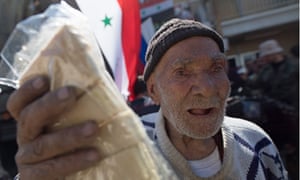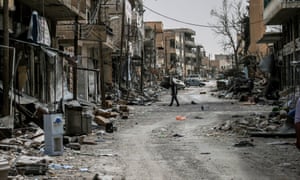The Guardian

Link
Starvation is still being used as a weapon of war in Syria, despite a partial ceasefire that was meant to ease profound humanitarian suffering and open a political path that could bring the war to an end.
Almost six weeks after the ceasefire was implemented, NGO officials say that neither goal is being achieved, and less aid is getting to areas that remain besieged by the Syrian government.
According to Médecins Sans Frontières (MSF), the past two weeks have been particularly severe in opposition-held areas near Damascus where two hospitals have been bombed, the last remaining doctor in the nearby town of Zabadani shot dead by a sniper, vital medical items being removed from aid convoys and access to critically deprived areas remain blocked.
The UN is also reporting a worsening humanitarian crisis, with government officials routinely denying permission needed for trucks carrying food and medicine to enter the 15 besieged areas it controls across the country. Jan Egeland, special adviser to the UN envoy to Syria, said four of five convoys were not allowed to move in recent days.
“In two places where we were able to go to, Tiermalah and Afrin, some 45,000 people did get relief there,” said Egeland. “We have come up now to 446,000 people in hard to reach and besieged areas since the beginning of the year, but it’s not getting better, it is actually slowing down.”
The hard-to-reach areas are zones in which starvation sieges have been enforced by the Syrian regime or its proxies throughout the five-year war.
Three other parts of Syria are also besieged, two by Islamic State and one by Islamist forces north of Aleppo who have partially surrounded two Shia villages.
However, the opposition-held areas of Ghouta, Duma, Barzeh and Daraya on the outskirts of Damascus and Zabadani and Madaya, closer to the Lebanese border, remain the most seriously affected, with reports of new deaths by starvation and widespread malnutrition.
In Daraya, the remaining women this week wrote a letter urging renewed efforts to deliver aid. “There is no food at all in Daraya,” the letter stated. “There are cases of malnutrition and we have resorted to cooking soups made purely of spices in order to stave off hunger. There is no baby milk and no breast milk due to malnutrition. Even something as simple but as necessary as dishwashing liquid is unavailable. There are no cleaning supplies in order for us to ensure hygiene and keep diseases away.”
Syrian officials had pledged to allow more aid into areas it surrounds after the ceasefire announced by Russian president Vladimir Putin took hold. The ceasefire has led to a reduction in attacks, but excludes areas held by terror groups such as Isis and Jabhat al-Nusra. Opposition groups have also been targeted, especially in deprived areas.
MSF said two hospitals it supports in East Ghouta were bombed last week, killing 38 and wounding 87, including five medical staff. “The doctors we are speaking to have not received any aid in Daraya and Duma, they remain completely blocked from any official humanitarian access. Barzeh, near Damascus and Al Waer, near Homs also face repeated closure of access, said Dr Bart Janssens, the medical group’s director of operations.
“When convoys are getting through in other areas, the doctors we are working report that vital items such as surgical and anaesthetic supplies, blood bags have been removed. The quantities of IV fluid received are also consistently way less than what is needed.”
Peace talks are due to resume in Geneva this month, but are likely to remain deadlocked on the future of the Syrian president, Bashar al-Assad, who opposition groups insist must leave before a political transition can take effect, but whose role, Russia and Iran say, is not up for discussion.


No comments:
Post a Comment